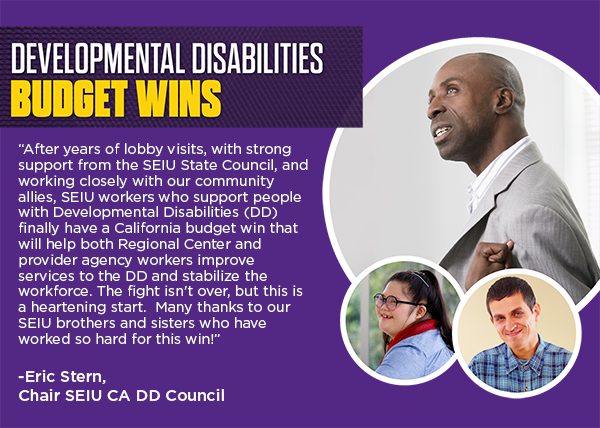
SEIU members win historic investments in developmental disability services in our next state budget
California’s 2021 budget reflects years of hard work by our members to address needs within the intellectual and developmental disability community. For more than a decade, the service coordinator ratios at Regional Centers have been out of federal and state compliance, leaving our members with caseloads of 90 families or more. In addition, a 2019 rate study identified the vendor system as underfunded by $1.4 billion. Our members have fought hard on both issues over the years and this year’s budget addresses both.
“After years of lobby visits, with strong support from the SEIU State Council, and working closely with our community allies, SEIU workers who support people with Developmental Disabilities (DD) finally have a California budget win that will help both Regional Center and provider agency workers improve services to the DD and stabilize the workforce. The fight isn’t over, but this is a heartening start. Many thanks to our SEIU brothers and sisters who have worked so hard for this win!” said Eric Stern, Chair of the SEIU California DD Council.
What do we do next? Learn how you can take action.
- Participate in DSP Training focus groups to give input on
training needs, training delivery preferences/needs, and the need
for credit for longevity, in order for SEIU to give feedback and
guidance on how this money will be allocated. To participate in
upcoming DSP Training focus groups,
contact: d_mulvey@hotmail.com & sternbychoice@gmail.com
- Thanking our elected officials. Our goal is for members from
every chapter to develop ongoing relationships with their elected
officials in order to safeguard this funding and services to the
DD,
contact: d_mulvey@hotmail.com & sternbychoice@gmail.com to
be included in upcoming DD lobby visits.
- Support the Federal Better Care Better Jobs Act. Urge your members of Congress to support the $400 billion in funding to strengthen and expand the Medicaid HCBS infrastructure and workforce.
Check out what’s in the final budget agreement we secured for developmental disabilities
- Beginning in 2022-2023, $61.8 million in ongoing funds will
be allocated to hire 921 service coordinators in Regional
Centers to reduce caseloads and bring ratios into
compliance.
- Contains a 5-year phase-in for rate reform, identified by the
2019 rate study, focused on quality benchmarks, metrics, and
outcomes to assure person-centered service delivery for
individuals with developmental disabilities. $89.8 million is
allocated in 2021-2022, rising to $1.233 billion in
2025-2026.
- Eliminates the suspension of the 8.2% Provider Supplemental
Rate Increase and lifts the implementation of the Uniform Holiday
Schedule, $309.6 million in 2022-2023.
- Invests $2.9 million in 2021-22 to establish a training and
certification program for direct service professionals (DSPs)
tied to wage differentials. Beginning in 2023-24 ongoing cost
increases to $51 million with the intent to professionalize
and diversify the workforce.
- $4 million earmarked in 2021-22 for the Performance Incentive
Program to create an outcome-focused regional center operations
funding program.
- $24 million dedicated to eliminating frozen rates for
Intermediate Care Facilities for Individuals with Developmental
Disabilities (ICF/DD) and Pediatric Subacute
Facilities.
- Restores social recreation, camping services and educational
services and allocates $19 million in 2021-2022, $31.6 M in
2022-23, and $36.8 million General Fund in 2023-24 and on-going
to fund these services.
- Codifies directives put in place during the pandemic for
crucial Regional Centers that allow our members to continue to
provide remote services, virtual meetings, and remote Early Start
Services at the request of the families.
- Provides $5.6 million in ongoing funds for implicit bias
training for all service coordinators at Regional
Centers.
- Dedicates $10 million in ongoing funds to establish an
intensive caseload ratio (1:40) to improve service delivery to
consumers in underserved communities and for individuals with low
to no purchase of services within the regional center system.
- Devotes $3.6 million in total funds (including federal dollars) with $2.2 million for establishing a verification process for bilingual competency and providing a wage differential to Direct Service Professionals (DSPs) to increase the availability of staff who are bi/multilingual. Beginning in 2023- 24, ongoing costs increase to $6.5 million.

